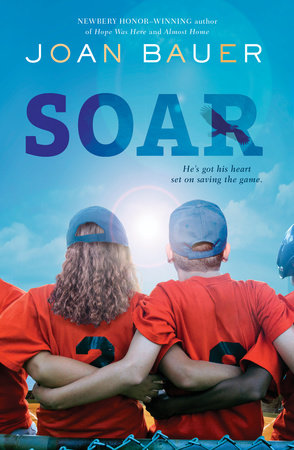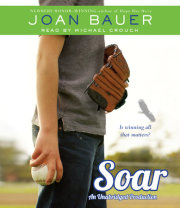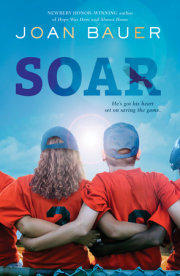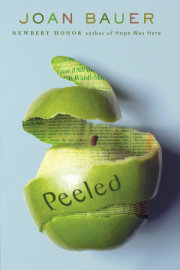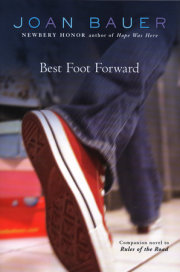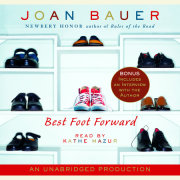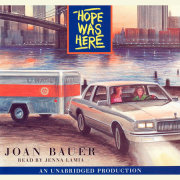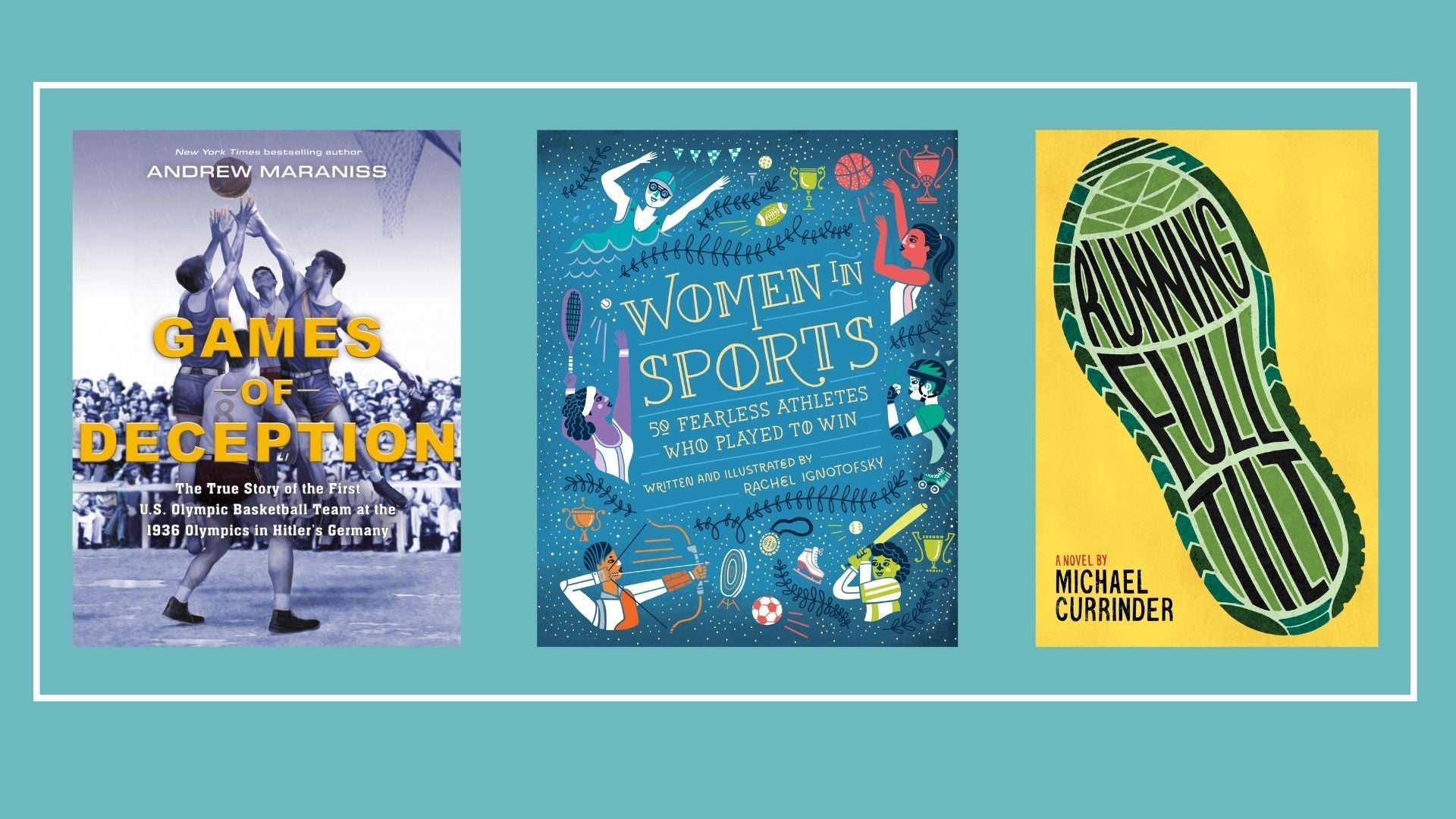Also by Joan Bauer
Title Page
Copyright
Dedication
Chapter 1
Chapter 2
Chapter 3
Chapter 4
Chapter 5
Chapter 6
Chapter 7
Chapter 8
Chapter 9
Chapter 10
Chapter 11
Chapter 12
Chapter 13
Chapter 14
Chapter 15
Chapter 16
Chapter 17
Chapter 18
Chapter 19
Chapter 20
Chapter 21
Chapter 22
Chapter 23
Chapter 24
Chapter 25
Chapter 26
Chapter 27
Chapter 28
Chapter 29
Chapter 30
Chapter 31
Chapter 32
Chapter 33
Chapter 34
Chapter 35
Chapter 36
Chapter 37
Chapter 38
Chapter 39
Chapter 40
Chapter 41
Chapter 42
Chapter 43
Epilogue
Acknowledgments
Chapter
1
I’M PROBABLY TWELVE years old; that’s what the doctors think. I could have been born anywhere, but it was most likely in Indianapolis, Indiana—at least that’s where I’ve decided I was born, because that’s where I was found. Specifically, I was found at Computer Partners Ltd. in the snack room, right by the coffeepot. I think it’s one of the reasons that I like the taste of coffee—it reminds me of home. I was found by Walt Lopper, a computer geek who had never so much as diapered a baby, but there I was, and I’m told it was clear that I did need a new diaper. I needed a lot of other things, too, but my bottle wasn’t empty, so the police felt that meant I hadn’t been there long. Walt found me at seven a.m. on October third—it was his turn to make coffee and he always got to work early. I was in my baby chair with a note:
pleez tek car of him Bcaz he my best boy
I no yur good!
There weren’t any other clues about who left me there, but I’m inclined to believe it was my mother, who might have worked nights cleaning office buildings. I had a little stuffed eagle that I was gnawing on, but other than that it was your usual thing. Walt called the police and they came and took me to the station and then someone from child services came and took me to a safe place, although Computer Partners Ltd. was a safe place, real safe, otherwise my mother wouldn’t have left me there. I’m told I didn’t cry, I just watched people and took things in, but if you wanted to see what I was made of, try taking the stuffed eagle from my little hands. I’d yank it back and screech, “No!”
They think I was nine months old when I was found, so saying “no” is a pretty big deal. Walt says it indicates I had a big brain, possibly like Einstein. Walt has a big brain. He’s officially a computer genius, but even bigger than his brain is his heart, which he says he hadn’t paid that much attention to until I came along.
The police tried to find the person who left me. I refuse to use the word abandoned because I’m fairly certain that my mother loved me and didn’t have much choice but to leave me. I’m also fairly certain that she knew it was Walt’s day to make the coffee. I think she probably checked out who was in that company and would never have left me there on a Monday, which was Dirk Dagwood’s day to make coffee. From what I’ve heard, he might not even have noticed a baby sitting there chewing on a stuffed eagle. He was that kind of clueless.
It took a while for Walt to adopt me, being a single man and all. He had to get trained and certified as a foster parent. It took another year of my living with him to convince the judge he should be my official dad. Walt spent a lot of time trying to figure me out, and I’m told he talked to me like I was a baby genius. He read me articles from computer magazines, he took computers apart and told me what he was doing and why. During baseball season we watched the games together and he told me how the pitcher was trying to psych out the batter and what some of the signals meant. My favorite signal involved tapping your nose, which Walt said could mean anything, depending on the day. I tapped my nose a lot, and Walt carried me around explaining what everything was and how the world was a pretty complicated place, which I already knew.
When the adoption went through, Walt said, “It’s official now. Okay?”
“Okay,” I said. After that I started talking to Walt and to my stuffed eagle that I named Baby. I didn’t talk to anyone else until later.
The problem with having a story like this is people don’t know what to do with it. Their faces get super sad and their shoulders slump as they pat me on the head, which I find irritating, and say, “My, you are a little survivor, aren’t you?”
Well, I suppose I am. But since I don’t remember the first few years of my life, I don’t feel like I can take any credit for it. And then there’s the issue of my birthday, which is a theory, but schools seem to need an actual date, so I count three months ahead from October third when I was found to early January. I give the doctor a fudge factor in his estimate of one week, which puts my birthday on January tenth. Getting close is important to me.
I’ve lived in four different places, because Walt is a consultant and has to move around a lot. At my last two schools my class was learning the recorder. I’m so done with this instrument. I can play “Go Tell Aunt Rhody” in my sleep. I told Eddie Bartok, who was failing recorder, to pretend he was a snake charmer—they play instruments like this and get the snakes to dance to the music. This caused Eddie to practice like crazy, but his mother wouldn’t get him a snake. He tried charming worms in the garden, but worms today, they couldn’t care less. He played “Go Tell Aunt Rhody” to his dog, who yelped and ran away. Once Eddie was at my house with his recorder and he tried to charm Baby.
“Inanimate things don’t respond!” I mentioned.
And anyway, nobody can charm an eagle.
You can’t keep an eagle in a cage or have one for a pet.
The number one rule for eagles is they have to be free.
I’m sure this is why my mother gave me that stuffy. She knew I had an eagle inside of me. Not everybody does.
But when you do, you’d better pay attention and deal with it, because if you don’t, you’ll have one intensely frustrating life.
Chapter
2
“I HAVE A new consulting gig,” Walt tells me. “They pay up front.”
This is excellent news, because lots of Walt’s clients take forever to pay him. Walt has his own consulting company, the Magellan Group. It’s not a group, exactly, and no one is named Magellan; it’s named after Ferdinand Magellan, our favorite dead-for-centuries explorer, who, like Walt, worked 24/7.
“Where is it?” I ask.
“Ohio.”
We’re living in St. Louis and I really, really like it here.
“They need me for a couple of months, Jer. It’s kind of an emergency.”
Everything Walt does is somebody’s emergency. No one calls my father and says, “Hey, all systems are go here. Just wanted you to know.”
“Where in Ohio?” I ask.
“Near Cincinnati, but I don’t think—”
“The Cincinnati Reds are looking strong this year, Walt.” They’re my third favorite team.
“They are, but I don’t think—”
“The name of the town, Walt . . .”
“A smaller place than Cincinnati. Hillcrest, Ohio.”
“They have a hill with a crest, right?”
Walt laughs. “Maybe. They have a company there and . . .”
The “and” part is always “and they need a little help.” Believe me, when Walt Lopper gets called in, it’s because people need a lot of help.
“They’ve got a little problem, Jer.”
“What kind of problem?”
“Their robots keep falling down.”
“Why?”
“It’s unclear.”
I look in the corner. “Jerwal, are you awake?”
Jerwal, the robot Walt and I built together, glows and beeps.
Walt hasn’t thought about taking any out-of-town business for a long time, because of my heart. Four years ago, I had a perfectly healthy heart. Then something called cardiomyopathy happened and everything changed.
I look at Walt, who sat with me every day I was in the hospital, who never once made me feel like I wasn’t his kid, or was any kind of disappointment or a drain on his life.
“When do you have to be there?”
“Yesterday, Jer.”
Today is March twenty-seventh, and lots is about to happen here.
The Cardinals’ opening day is April thirteenth and we have tickets.
The science fair at my school is coming up and I’ve been working on a project that shows the trajectory of a well-hit baseball in 3-D. I’ve been thinking about contacting the manager of the St. Louis Cardinals to come see it—my findings could be big.
I take a deep breath and pull out my phone. Research is critical to decision making.
“Hillcrest, Ohio,” I read to him. “Population 12,761, located in Ohio’s rich farmland in the western part of the state. A small Midwestern town known for the excellence of its high school baseball program.” This is getting interesting. “The Hillcrest High School Hornets have won six state championships and twice clinched the nationals.” I look up. “We can gorge ourselves on baseball, Walt!”
Walt’s face has that half-sunk look it gets when he hasn’t told me everything.
“I think, Jer . . . Well . . . I called your aunt Charity—”
“No.”
“Let me finish. I called her and she said she would stay here with you so you could finish school and—”
“No!”
“I want you to stay near Dr. Feinberg.”
“There are doctors in Cincinnati.”
“Wonderful doctors, no doubt.”
“Do you care about my heart, Walt?”
“What kind of a question is that?”
An unfair question.
“She treats me like I’m a little kid!”
“I think if we talk to her—”
“We’ve done that. Aunt Charity smothers me.” I feel my face get hot. “She makes me wash my hands hundreds of times.”
“You are supposed to avoid infection, my man.”
“Walt, please. I don’t need to be a fanatic about it.” I squirt antiseptic goo on my hands and rub it in, counting to ten. “She asks me every morning”—I can hardly say it—“if I’ve had a bowel movement!”
“That’s a tough one, Jer, but we do need to make sure all systems are go.” He laughs at his joke.
“And do I have to even mention that she forced me against my will to make angel ornaments with little puffy skirts?”
Walt shakes his head. “I know. But she’s been here for us. She’s really helped out.”
Aunt Charity stayed with us for eight months when I was in and out of the hospital. I’m totally grateful she did this.
“She’s my only sister. What can I tell you?”
“You can tell me she’s not coming and I can go with you. I love her, okay? I just can’t live with her right now.” Or possibly ever.
Walt stands up. “It’s only for a couple of months. What could happen?”
Phone again. I look up “shortest wars in history.” There’s lots of material here. “Whole wars have been fought in less than thirty days, Walt. Can you really take the chance?”
Walt sips his coffee and looks at the map of the ancient world that I gave him for his birthday. It shows how wrong they were back in the 1500s. This was what Magellan had to deal with. Despite all that, he circumnavigated the globe before people knew it was a globe.
Is that vision or what?
“You’re telling me, Jer, you want to leave sixth grade at the end of March and come with me to Hillcrest, Ohio, where I will be working day and night?”
I nod.
“What would you be doing there?” Walt persists.
“Gaining brilliance?”
“You’re already too smart.”
“I’d go to school and I’d help you. I could make dinner and—”
Walt shakes his head. His beard is getting some gray in it. People say it makes him look distinguished. He’s wearing the T-shirt I got him for Father’s Day—it has a mug of coffee and, underneath that, the words GAME CHANGER.
It’s kind of our story.
“Jerwal,” I say, “come forward.” Jerwal moves slowly toward us. “Would you like to help the robots who are falling down?”
Jerwal has no idea, but he likes hearing his name. It took us months to get the voice-activated part working. We had to shorten his name because he couldn’t understand “Jerwalthian,” as in The Jerwalthian has entered the atmosphere.
Walt sips more coffee. “I’m sorry about how I live. I want you to have a stable environment.”
“I don’t feel unstable, Walt.”
“You know what I mean. Not so much change.”
“You don’t change.”
He laughs. “You’re referring to my wardrobe?”
Walt wears blue shirts with jeans or khakis most days.
I stretch out my arms like I’m flying. “So we just swoop into Hillcrest and make it happen.”
Walt sips coffee, thinking.
I sip decaf. “Jerwal, do you want to go play with the robots in Ohio?” Jerwal beeps and moves his head and arms from side to side.
Walt points a finger of ultimate authority at me. “For me to even consider it, Jer—and I’m not saying I am—Dr. Feinberg needs to sign off on this one hundred percent. You understand that might not happen.”
I clear my throat. “I understand that in any contest, I will be tested, maybe to the boundaries of my ability. And when this happens, I will remember that I have overcome great difficulties already, and all that strength is in me.”
Walt sniffs. “Which coach said that?”
“I just created it.”
“Not bad.”
When I’m a coach I’m going to tell my players to say that. I write it down.
Walt studies my face.
“I’m fine, Walt.”
I say that a lot because it’s true.
It’s got to be true.
Chapter
3
NOT EVERYONE ON my transplant team could be here. We got this appointment fast.
Dr. Curchink is out sick and Dr. Meredith has an emergency with another patient, but Dr. Feinberg is here, and Hassan the transplant nurse, and Millard the tech guy, who keeps track of everything. Millard just gave me an echocardiogram to test the strength of my heart with sound waves. Hassan gets a blood sample from my left arm. I make a fist.
“Your blood’s still red,” Hassan says.
“I’ve been working hard to keep it red,” I tell him.
Hassan smiles.
There’s a plastic heart on the counter. So many people just take their hearts for granted. I did until third grade, when I caught a virus that slowly began attacking my heart muscle. I got a lot of colds that year. I wasn’t eating much. I’d run and have trouble breathing. We thought it was asthma at first. It wasn’t even close to that.
Being a computer genius, Walt knew about viruses. “We’re going to find out what’s going on with you,” he told me. “That’s going to mean a lot of tests, and probably a few extra doctors.”
“I don’t want extra doctors.”
You don’t always get what you want.
Two years later, I had to have a heart transplant. I was ten. I don’t recommend the experience, but I can promise you, it’s so much better than dying.
I told Aunt Charity I wanted to keep my old heart in a jar at home to remember, but she started screaming about the intense grossness of that.
“I made it to ten years of age with that heart,” I told her. “It’s part of me.”
She threw up her hands and said absolutely not.
“He’s kidding about keeping it at home,” Walt assured her.
We gave it to science—the best solution—although first I wanted to use it for the science fair at school.
“How can you even think of these things?” she shrieked.
“Maybe we can visit it?” I asked her.
That didn’t work, either.
Right now Dr. Feinberg, who did my transplant surgery, is looking at me like he always does—checking my eyes without saying he is, checking to see if I have energy without saying he is.
Walt says, “We want zero risk, doctor. We are open to whatever you think is best.”
“Which would be me going to Ohio.”
Dr. Feinberg is looking at my test results. “Jeremiah, as long as I have known you, you’ve always been clear as to what you want. How are you feeling?”
“Fine. Really fine.”
“How’s the energy level?”
“You know, it’s okay.”
A medical nod. “Arrhythmia? Swollen ankles? Brain fog? Nausea? An uncontrollable desire to play meaningless, soul-crushing video games all day?”
“Only the last one.”
“Shortness of breath?”
I breathe like it’s hard.
Dr. Feinberg looks at me. “This is a joke?”
“Yes.”
“You’ll be gone how long?”
Walt says, “Two months or so. But if this isn’t a good idea—”
“That’s a lot of compacted stress: packing, saying good-bye, moving, a new school, and then coming back.”
Walt says, “If you don’t think this is a good idea—”
“I want to understand,” Dr. Feinberg adds. He always says this. It’s why he’s a great doctor.
Walt starts explaining about this new consulting gig he’s got, but he’s not selling the concept. He hasn’t once mentioned the stress of living with Aunt Charity. He has hardly touched on the theme of baseball and how tomorrow’s stars are playing on the Hillcrest Hornets today, how it’s a chance to see them before they get really big, how their champion pitcher throws an unbelievable fastball.
I interrupt and make my case. I also emphasize the robots.
“How fast does the kid throw?” Dr. Feinberg asks.
“Ninety-four miles per hour.”
Millard, Hassan, and Dr. Feinberg nod, impressed.
I say, “This is a once-in-a-lifetime opportunity.”
That’s a big sentence for me. Before I got my new heart, I was so sick, I wasn’t going to make it. That surgery went pretty well, considering where I was starting from. They hoped it would have gone a little better.
My scar from the transplant runs from the top of my chest to the middle. I showed it to my best friend, Yaff, who said, “Tell people you got attacked by zombies and survived.”
I can walk blocks at a time, but I still can’t run.
“Jeremiah,” Dr. Feinberg says, “you need to be aware of two things. First, you will need to have another team in Ohio and check in with them.”
I know this.
“Second, you have to be uniquely careful of infection.”
The team stares at me. I say I know that, too.
“We are talking about bathing in antiseptic lotion.”
I take out the bottle from my pocket.
“We are talking about naps.”
I groan.
“And you must have realistic goals for your time there. Do you have those?”
“I want to see as many baseball games as I can, and I want to do well in school and hang out with Walt and maybe build another robot.”
They are still staring at me like that’s not enough.
“Okay, and I will run away screaming if I see anyone sneezing.”
“No running,” the doctor says.
I nod. I hate the no running part. I tried running after my surgery and that didn’t go too well.
“And I won’t eat at salad bars because of the germs.”
“They’re infested with germs,” Hassan reminds me.
“And when I’m at baseball games, if I feel tired or anything, I will let Walt know.”
Still staring.
“It’s what I do here!”
“We’ll discuss this and be back in a few minutes.” Dr. Feinberg walks toward the door with the team.
“Don’t forget the part you can’t put on a chart,” I shout. “Baseball and robots. How can this not be good for my heart?”
The doctor smiles. Millard doesn’t. They walk out.
Walt says, “You know, whatever they decide, it’s for the best.”
I look at him. His eyes are kind, but tired.
I can do this, Walt!
. All rights reserved. No part of this excerpt may be reproduced or reprinted without permission in writing from the publisher.

